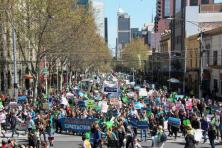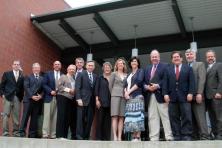On March 9, 2012 New Energy Cities partnered with the City of Hillsboro, Oregon on a workshop to build a shared strategy to enhance Hillsboro’s leadership in the new energy economy, and to identify projects that would benefit the city and its local businesses.
The City of Hillsboro and its community leaders have already laid important groundwork for national clean energy leadership. In 2011, the US Environmental Protection Agency’s Green Power Program ranked Hillsboro second in the nation in green energy purchased community-wide (in both absolute and percentage terms). Much of this achievement was due to a significant purchase of green energy by Hillsboro-based Intel, the world tech giant. Portland General Electric’s popular Clean Wind program was also a factor, with over 2,600 residents and business participating.
Held at the Hillsboro Civic Center, one of the nation’s first LEED Gold-certified municipal buildings, the workshop focused on ways the City and the community could partner on energy efficiency, distributed renewable energy, district energy, advanced energy technologies like smart meter deployment, and electrified transportation. In attendance were representatives of the Hillsboro Chamber of Commerce, the Oregon Department of Energy, Portland General Electric, Solar World, Intel, Epson, and ClearEdge Power, among others.
The workshop resulted in a draft Opportunities Framework document to inform future discussions led by the Hillsboro Sustainability Task Force, an outgrowth of the community’s Hillsboro 2020 planning process.
On June 14, 2012 New Energy Cities facilitated an invitation-only Energy Future workshop on building energy efficiency in Boise, Idaho, partnering with the City of Boise, Idaho Power Company, the Boise chapter of the US Green Building Council, and Boise State University’s Center for Advanced Energy Systems. The workshop was held at the newly renovated and soon to be LEED-certified Concordia Law School in downtown Boise.
During the workshop the New Energy Cities team provided participants with a comprehensive view of market trends in building energy systems, and identified energy efficiency opportunities for the community to consider. Over the coming months, the planning team will review and finalize an action plan that emerged from the workshop.
Like Hillsboro, Boise has a number of excellent community assets in the areas of clean energy and energy efficiency. The Boise Metro Chamber of Commerce has placed a significant emphasis on energy policy issues in its recent leadership convocation.
Idaho Power Company has made a notable investment in demand response and energy efficiency, deploying advanced energy meters to 100 percent of its customers; partnering with the City on a residential energy assessment project; and launching pilots involving time-of-day pricing and electric vehicles.
The Center for Advanced Energy Studies (CAES) conducts applied research on a variety of energy topics, with relevance to the practical implementation of building efficiency strategies. The Boise chapter of the US Green Building Council has provided technical assistance and support on green building approaches to the building community, and private developers have made significant investments in green buildings.
Over the course of the spring, New Energy Cities also worked with the City of Issaquah, Washington to develop a Sustainable Energy Strategy for that community in response to an Energy Efficiency Conservation Block Grant (EECBG) from the Washington State Department of Commerce. This work involved quantitative analysis of ways the community could achieve its greenhouse gas emissions reduction goal of 80 percent below its 2007 level by 2050, and was featured in a Seattle Center “Next 50” panel, “Carbon Neutrality: Dream or Reality?”
The New Energy Cities team selects its city-partners based on strong political leadership, utility partners, and citizenry committed to clean energy leadership.




